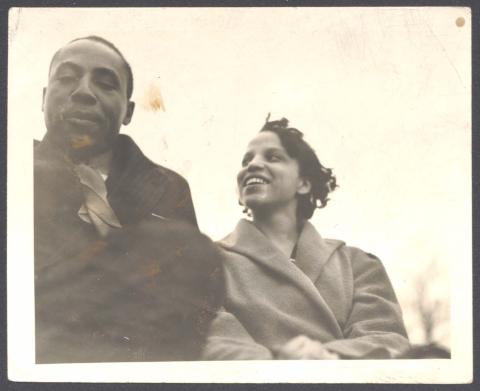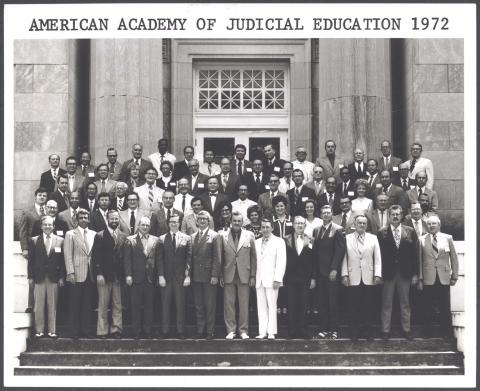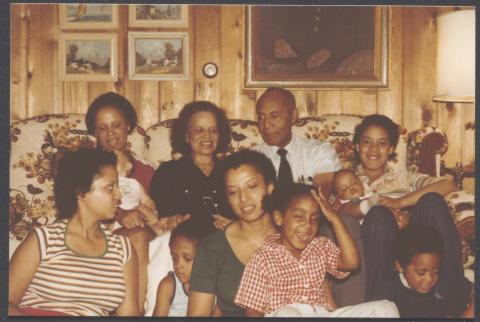Ivorey Cobb: New Hampshire’s First African American Judge
Judge Ivorey Cobb (1911-1992) was a distinguished military veteran, a Black newspaper publisher, lawyer and the first Black judge appointed in New Hampshire. Over the last eight months, the UNH Library’s Digital Collections team has been working on creating a digital collection from the materials generously donated by the Cobb family to the Milne Special Collections and Archives.
Born in Andalusia, Alabama, in 1911 to Samuel Cobb and Minerva “Minnie” Jenkins Cobb Squires, Ivorey Cobb grew up in an era of political turmoil and civil unrest. Over his life, he dedicated his time and experience to improving this country and his community, especially in New Hampshire.
Cobb’s justice career began early in his life as a journalist and newspaper publisher. In 1937, he founded the Pittsburgh Examiner, a newspaper focused on sharing stories and events relevant to the African American community in Pittsburgh. That same year, quotes from a telegram written to the U.S. Supreme Court by Cobb denouncing President Roosevelt’s appointment of Hugo L. Black, a known Ku Klux Klan member, made their way into the Wednesday, September 29, 1937, issue of the Pittsburgh Post Gazette.

Newlyweds Ivorey Cobb and Elsie Margaret Stanton Cobb circa 1938
In 1938, Cobb married Elsie Margaret Stanton Cobb and soon she was helping him distribute the weekly newspaper. In 1940, Cobb and Charles Estelle, the newspaper’s business manager, travelled to Chicago to attend a conference put on by John Herman Henry Sengstacke of the Chicago Defender. It was at this conference that the National Newspaper Publishers Association (NNPA) was born. However, it was originally known as the National Negro Publishers Association until the name was changed in 1955. It was the largest known gathering of African American newspaper professionals at the time. Selected issues of both the Pittsburgh Crusader and Pittsburgh Examiner can be viewed online as part of the Cobb Collection.
Cobb left the newspaper business in 1942 when he joined the United States Army but remained an outspoken defender of civil rights. He dedicated the next twenty years of his life to serving the country, working his way up to the rank of Major. He held many positions throughout his military career, including logistics officer and Captain of multiple Transportation Trucking Corps units.
Many of his letters that can be found in the Milne Special Collections and in the Digital Collections, discuss what life was like in the military and the hardships he endured both State side and abroad. During his time in the Army, Cobb served in both World War II and the Korean War, often finding himself stationed in Austria, Italy, Germany and Korea. While he was stationed in Europe, Elsie and their daughters moved abroad to live with him in Italy and Germany.
Cobb continued his undergraduate and graduate education while in the military by studying at the University of Maryland Overseas Division in Italy and Austria, Northeastern University and Rutgers University. After his return to the United States in the late 1950’s he enrolled at Suffolk University School of Law and began pursuing a law degree while stationed at Fort Devens. During this time, he also continued working as the editor for the Camp Drum Sentinel and Fort Devens Dispatch. He completed his Bachelor of Law degree in 1960 and retired from the military two years later in 1962.
After receiving his law degree, Cobb and his family moved from Massachusetts to Colebrook, New Hampshire, where he established his own law practice. In 1964, Cobb was nominated by Governor John W. King and appointed by the New Hampshire Executive Council to the position of Special Justice of the Colebrook Municipal Court, thus making him the first African American jurist to serve in this role in New Hampshire State history.

Judge Ivorey Cobb stands in the second row from the bottom, third from the left
News of Cobb’s appointment made national headlines in various publications, including The New York Times and The Boston Globe. Newspaper clippings from these papers can be found in the Digital Collections. Not long after, he was elected president of the Coös County Bar Association by his peers. A year later, Suffolk University awarded Cobb an Honorary Doctor of Laws.
In 1968, Cobb was confirmed as Judge of the Colebrook District Court. Additionally, New Hampshire Governor Meldrim Thomson Jr. appointed him a Commissioner of the Governor's Commission on Crime and Delinquency of the State of New Hampshire on February 16, 1973. Cobb also served on the New Hampshire Commission for Civil Rights.
As a judge, Cobb remained a devoted member of various councils and associations related to the judiciary. He was a founding member of the Judicial Council of the National Bar Association, an elected member of The World Association of Judges of the World Peace through Law Center, and a member of the American Judges Association.
Cobb retired from office at the required age of 70 in 1981 after serving as Colebrook District Court Judge for 13 years. He went on to spend the next decade of his life as a valuable member of the Colebrook community and a loving grandfather to his many grandchildren.
Judge Ivorey Cobb died on December 18, 1992, at the age of 81 and was survived by his wife Elsie Margaret Stanton Cobb, who passed away the following year at the age of 77. They were survived by their three daughters: Marilyn Eva Cobb McDonald, Gretel Anne Cobb Webster, and Louise Minerva Cobb Phillips as well as their seven grandchildren, brother-in-law Reverend James Clinton Hoggard and Elsie’s sisters Eva Stanton Hoggard and Marion Stanton Taylor.
On August 11, 2023, Judge Cobb and his legacy of jurisprudence was honored with a portrait unveiling ceremony at the New Hampshire Supreme Court building in Concord, New Hampshire. The ceremony was attended by many family members and friends including Cobb’s surviving two daughters, Gretel Anne Cobb Webster and Louise Minerva Cobb Phillips. His portrait now permanently hangs near the entrance of the Law Library. Various news outlets reported on the historic event including WMUR, the Concord Monitor, and NH Bar News.

Ivorey and Elsie Cobb sitting with their daughters and grandchildren, 1979
On August 12, 2023, seventeen Cobb family members made their way to UNH to visit the collection housed at the Milne Special Collections and to meet with UNH Library’s Digital Collections team to learn more about the digitizing process, which includes hand transcription of the letters in the collection. For many of the visiting extended family members and grandchildren, this was the first time they were able to interact with materials in the Cobb collection.
The Cobb collection is made up of photographs, letters, newspapers, postcards, certificates and additional records that continue to be digitized by the UNH Library’s Digital Collections team with additional assistance provided by Louise Cobb Phillips, who has been reviewing transcriptions and identifying people in photographs.
A Wikipedia article for Judge Ivorey Cobb was created by the UNH Library’s Digital Collections team using source material from the Cobb collection to share and educate the general public about Cobb’s legacy and service as New Hampshire’s first African American judge.
Images were donated by the Cobb family and can be viewed in the UNH Library Digital Collections.